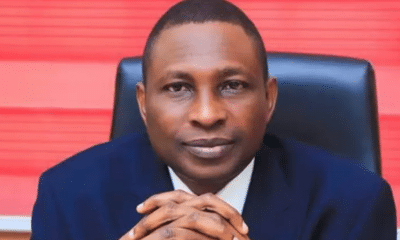Editorial
Issues With FG Students’ Loan And Tuition Fees

Almost 50 years after the General Yakubu Gowon regime instituted the students’ loan board in 1974 to provide Nigerian students with loans repayable after 20 years of graduation, President Bola Tinubu, on Monday, signed the Student Loan Bill into law which stipulates that beneficiaries start repaying two years after their national youth service. The piece of legislation, which was sponsored by the Speaker of the 9th House of Representatives, Femi Gbajabiamila, passed the third reading at the House on May 25, 2023.
Presidential spokesman, Dele Alake explained that the signing of the bill was in fulfillment of the President’s campaign promise to liberalize the funding of education in Nigeria.
He further disclosed that although the new law takes immediate effect, an inter-ministerial committee will be set up to work out procedures for the application and superintend over the process. On his part, the Permanent Secretary in the Ministry of Education, David Adejoh, disclosed that modalities are in the works to begin the disbursement of the student loans in September since Tinubu has directed that the first recipients of the loan must be available for the 2023/2024 academic session. This development has excited a cross-section of Nigerians like the national students’ body who described the student loan bill as a “way forward” in the country’s education system. This was as they expressed worry over the timeline for repayment.
Some aspects of the Access to Higher Education Act need to be highlighted even as public enlightenment: students who have secured admission into any public Nigerian university, polytechnic, college of education, or any technical and vocational education and training (TVET) school can apply for the loan but must show their bonafides. The act stipulates that the income of benefitting student or their family must be less than N500,000 per annum to be qualified for the loan. We however think this figure should be increased to at least N850,000 for more inclusivity.
The document further stipulates that defaulting in the repayment of the loan or aiding to default attracts a fine of N500,000 or two years imprisonment or both. This is even as applicants must provide at least two civil servants — of not less than level 12 years in service — as guarantors, or a lawyer with at least 10 years post-call experience; a judicial officer; or a justice of Peace. While repayment shall be by direct deduction of 10 percent of the beneficiaries’ salary at source by the employer, the beneficiary who turned out to be self-employed will have to remit 10 percent of their total profit monthly to the student’s loan account to be prescribed by the bank.
As per funding, the new act establishes the Nigerian Education Loan Fund with the power to administer, supervise, coordinate, and monitor the management of student loans in the country. It mandates the Fund to receive applications for student loans through higher institutions on behalf of the applicants and screen them. This bank will be financed by 1 percent of revenues generated by the Nigeria Customs Service, Nigeria Immigration Service, and the Federal Inland Revenue Service, as well as 1 percent of profits from the mining of oil and mineral resources in the country. Taken together, this will yield hundreds of billions of naira per annum for the scheme’s financing which should counter the pessimism of beneficiaries’ possible default thwarting the sustainability of the students’ loan programme. Assuming that more than N400 billion is raked in per annum as revenue from its statutory sources, the Fund can comfortably pay for four million students (at N100,000 per year).
Meanwhile, there are fears that the federal government is set to introduce payment of cost-reflective tuitions in the country’s public universities with Clause 3 of the Students Loan Act stipulating that: “the loans referred to in this Act shall be granted to students only for the payment of tuition fees”. Reacting to this concern, the permanent secretary said, “The introduction of tuition fee is not arising from the Act… whether we like it or not, the government can no longer foot the bill for universities”. While “tuition” does not exist in the bills of public universities, it is common knowledge that universities bill it under subheads like acceptance fees, departmental charges, course registration, library, result verification and maintenance fees.
Such fringe levies and fees have resulted in a situation where the average tuition in federal universities per semester is about N45,000 while state universities charge between N60,000 and N120,000. This burden shouldn’t be further pushed onto already pauperized parents, most of whom are shut out from their scheme because they earn a little above N500,000 in a year. This is more so as former pro-chancellor of Ambrose Alli University, Lawson A. Omokhodion, had insinuated in an op-ed that a typical public university in Nigeria would require tuition fees of N250,000 per session to live up to its responsibilities.
Be that as it may, Naija News does not believe that more funding is the magic bullet to all that is ailing higher education in the country. Tuition fees will definitely hit the roof since the loan is exclusively for tuition fees. How then will the larger populace not eligible for students’ loans be able to afford tertiary education? We are talking about a country where more than 133 million of the population are living below the poverty line!
Besides, the said Clause 3 is purported to contravene existing constitutional provision that makes tuition free in public institutions. The question of payment of tuition in Nigerian tertiary institutions remains a constitutional matter vide Chapter 2 of the amended 1999 Constitution. By the provisions of that chapter, it is illegal for any publicly-owned institution to charge Nigerian students tuition fees. While experts may argue that the new students’ loan act did not offend the constitution by abolishing the current or future regime of charges students of public institutions in Nigeria currently pay, the new act has laid a formal basis for the various governing organs of the public institutions in Nigeria to levy higher charges on students in the exercise of their financial autonomy.
It remains to be seen how beneficiaries would start repaying the loans just two years after NYSC given the high unemployment rate and the dearth of opportunities in the country. According to the National Bureau of Statistics, the rate of unemployment in Nigeria stands at 33.3 percent, under-employment is at 22.8 percent, 42.5 percent youth unemployment and youth underemployment is at 21 percent. In its International Global Economic Outlook report, KPMG forecast that Nigeria’s unemployment rate will rise to 41 percent this year. For the loan scheme to work, the government must get serious with job creation and put an end to the cronyism that makes vacancies in government offices go only to the children of the upper class and highly-connected members of society.
Naija News also recommends that courses on financial literacy and entrepreneurship be made mandatory for every undergraduate. This will go a long way to prepare beneficiaries of the students loans to settle their indebtedness to the Nigerian Education Loan Fund soon after graduation. The executive arm of government must steadily study and research the successes of the students loan scheme in developed countries and bring the learning to bear in its implementation in Nigeria.












